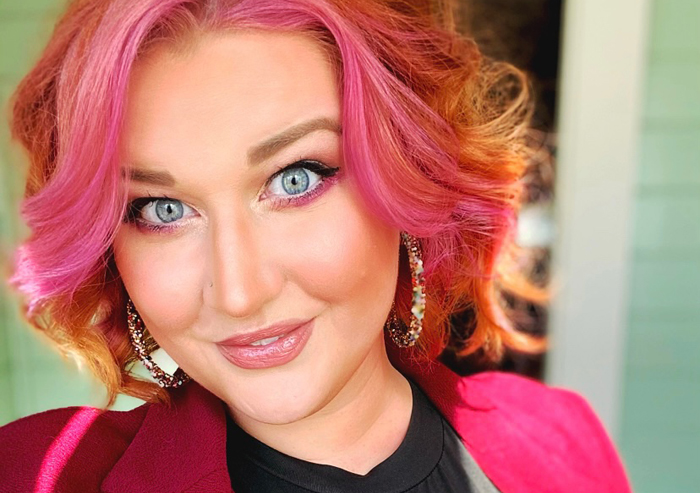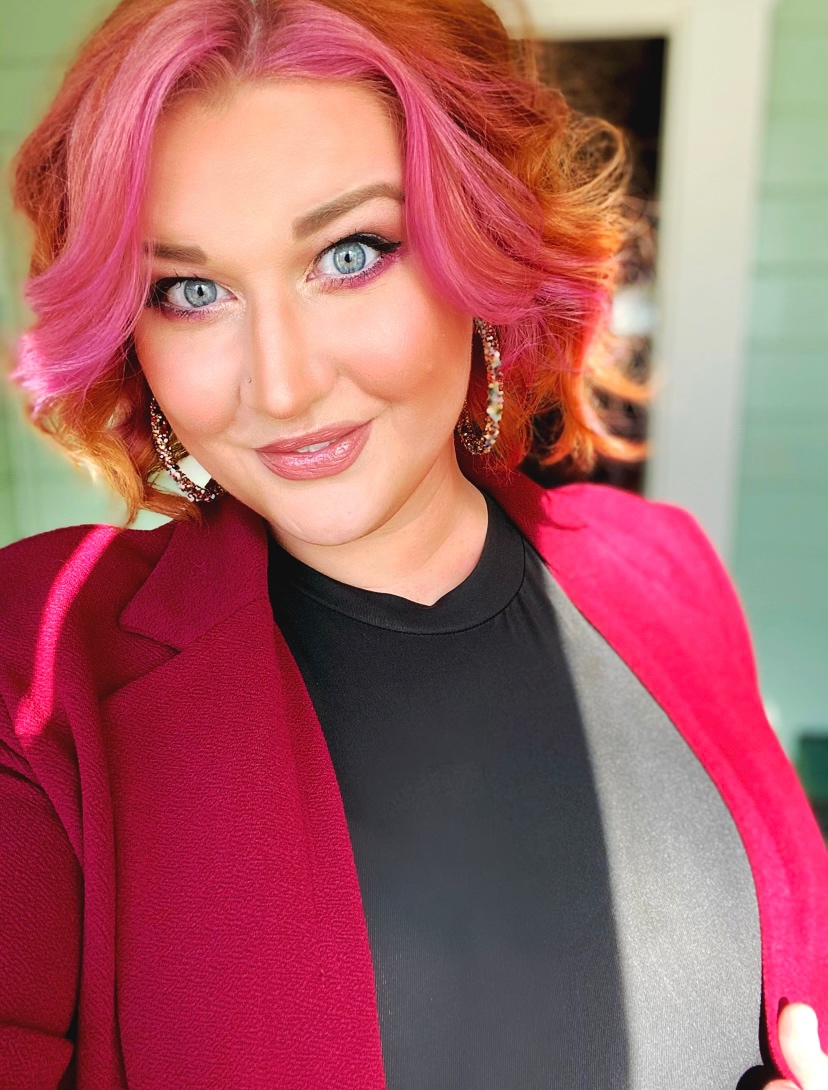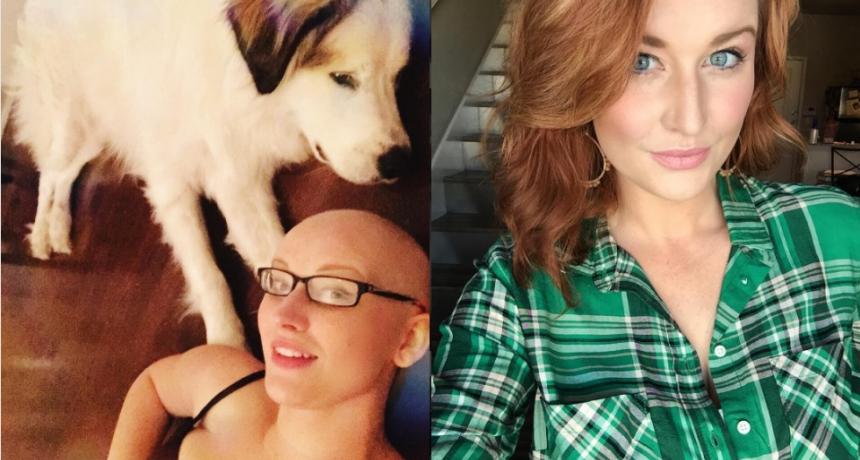
Share On Social!
By Maegan Molnar
Breast Cancer Survivor in San Antonio
I was only 26 years old when I was diagnosed with stage 2 triple negative breast cancer.
My world flipped upside down when I came across a lump during my very first breast exam just three weeks before my wedding. I had nine rounds of IV chemo before we realized it wasn’t working. I then had to stop treatment, have a lumpectomy, and then completely restart a different IV chemo regimen. I then had a double mastectomy with DIEP reconstruction followed up 9 rounds of an oral chemo therapy.
To say I was exhausted when it was over would be a complete understatement. To say I was naive when I thought it was over would be completely accurate.
This May will be 5 years since my diagnosis. I cannot imagine trying to add up the amount of needle sticks, scans, scares, biopsies, hugs, hospital gowns, or tears that have made up this monumental episode of my life.

I am now a therapist. I have been a wife for 5 years. I feel like a completely different person.
I have written blogs, been on a billboard, spoken on podcasts, spoken in college classrooms, spoken to doctors—all with the honor and purpose of advocating and educating people on the realities of living with cancer.
People often ask me during these lectures or in conversations how I was able to cope with my diagnosis.
Granted, I am a social worker so I did have knowledge regarding coping skills going into treatment. Did I use them? No, I did not. I used humor, mostly. I blogged. I cried. I cuddled my dog.
What most people don’t think about is that during treatment, patients are usually the most cared for. They’re getting the most calls, gifts, and social media engagement because, let’s be honest, A) their friends are genuinely worried about them and B) people want to say they know someone going through cancer treatment.
What people never asked me during interviews was how I was coping with life after cancer treatment.
They asked me if my scans were clear, if I was healthy, if I was going to try for a baby anytime soon (don’t ask people that). No one asked, “how are you coping, now that you’re living without the realities of going through cancer treatment?” I really wish someone had asked.
It wasn’t until things stopped spinning and the dust settled that I was able to look around and see the carnage for the first time.
Things had been happening so fast that I didn’t realize the toll my illness had taken on so many parts of my life. I felt like I was suddenly surrounded by fragments of relationships that couldn’t withstand the pressures of a serious illness, a steady stream of medical bills, and a huge sense of emptiness. The humor I had used to cope with cancer thus far seemed to be sucked out of everything, and I struggled to find the positivity in anything.
The steady “likes” on social media, the phone calls from friends, and the check ins suddenly dropped off, as if I no longer needed anyone in my corner, as if I was no longer needing any kind of support.
If you’re reading this and you’re a friend or an acquaintance of someone who is coming to the end of their treatment (and if you’re aren’t now, you will be at some point in your life), please take note.
It doesn’t end when treatment ends. Sometimes, it gets worse. Continue to check in. Take them to lunch. Ask them how they’re doing. Help them adjust as they navigate the ways their body adjusts to evolving into its new form. For some it’s awkward new hair growth, for some it is adapting to new scars.

Walk alongside them and hold space for this difficult time of transformation. Patients may not talk about their mental health with you, but know that this is a major issue and that support is necessary as they transition to life after treatment. They will appreciate that you haven’t abandoned them during this time.
If it’s you that is coming to the end of treatment, or perhaps you met that mark years ago, I hope you read this and it resonates. Don’t pressure yourself to fit into the same mold that once held you when you were diagnosed.
Don’t feel shame for not holding the same beliefs or for not wanting the same things that once brought you (or others) comfort. Cancer hog tied you, shoved you into a cocoon and now you’re being forced to adapt to this creature you came out as on the other side. You don’t look the same. You’re not the same. You didn’t ask for this. You will be expected to feel joyous at the end of treatment, and many people do. That’s okay. Many people also do not. If and when people ask why you’re not excited, ask why you aren’t “more grateful to be alive”, or anything of the like, remember that you are not the same. Trauma, survivors guilt, fear, sadness. These are just a few common things that impact the mental health of survivors. Because we do not talk about these things, the cycle of shame continues and people are not getting the help they so desperately need.
Just as everyone does not respond to treatment the same, not everyone heals the same.
Some women claim they have epiphanies after cancer and never take anything for granted again. That’s not me. My cancer “battle” didn’t end the day I was declared cancer free. Cancer impacts me every single day whether it is an emotional trigger, a glimpse of my scarred body in the mirror, or the ongoing medical issues that I have to deal with.
I was diagnosed with PTSD after cancer treatment and seeking treatment helped my anxiety immensely. What I thought was just sadness or depression from looking different was deep rooted trauma from surgeries and the like.
If I could pass on any advice to people going through treatment or who have completed treatment, it would be this: Admitting you need help does not diminish the fact that you went through something incredibly hard and you survived. It does not make you weak, selfish, or unappreciative to suffer from survivor’s guilt, depression, anxiety, PTSD, or any other mental illness. Don’t try and hold it together for others, because eventually you will crack.
If you are a parent, a spouse, a friend, or a coworker, remember that the best gift you can give to others is a whole and healthy you. Mental health after treatment shouldn’t be taboo.
Please seek treatment if you notice you have more bad than good days during the week. If you notice irregular sleep patterns, self-medicating, bouts of crying, negative self-talk, or any kind of suicidal thoughts or ideation.
Read more survivor stories and news about breast cancer!
Editor’s Note: This is part of a series of guest blog posts from Breast Friends Forever (BFF) in San Antonio, Texas (64% Latino). BFF is a support group that enables young breast cancer survivors to share stories and experiences, developed by the Institute for Health Promotion Research at UT Health San Antonio (the team behind Salud America!) and Susan G. Komen San Antonio. Email BFF or Visit BFF on Facebook. The main image above and additional images feature Maegan Molnar.
By The Numbers
142
Percent
Expected rise in Latino cancer cases in coming years



